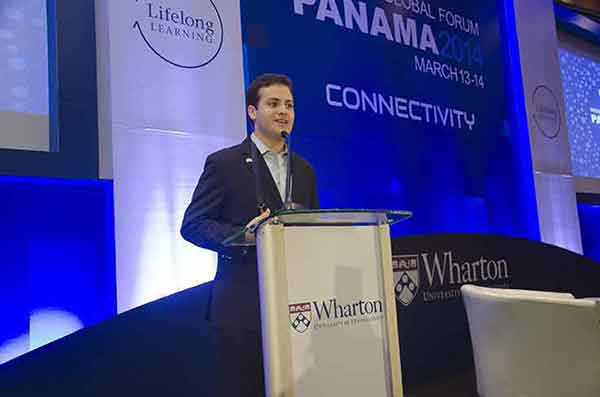As a Wharton student, I have been empowered to explore the world and learn from movers and shakers from the most diverse backgrounds. This past spring break, I was invited to serve as master of ceremonies of the Wharton Global Forum in Panama. I was selected after the organizing committee read an article on the Penn News website, in which I showed my pride for the country where I was born and raised. I was thrilled to represent my school and my country at the forum, and to showcase to my professors and peers the tremendous potential Panama holds.
Under the theme “Connectivity,” the Wharton Global Forum Panama brought together nearly 300 people. From C-suite executives at multinational corporations to undergraduates, attendees all sought to learn more about this small country and its role as a gateway to the Americas. During the first evening, attendees were able to network with their peers through specialized sessions for young alumni, CEO s and entrepreneurs.
The second day of the conference started with a keynote one-on-one discussion with Mauro Guillén (director of The Lauder Institute and Dr. Felix Zandman Professor of International Management) and Ricardo Martinelli, president of Panama. Professor Guillén’s lauded President Martinelli for increasing the minimum wage, raising pensions for the most disadvantaged elderly people and working toward creating a consumer-oriented economy as an engine of economic growth. I have been impacted positively by how President Martinelli, himself a business magnate, brought ideas used in the private sector to boost efficiency in the public sector. For instance, he spearheaded an ambitious program of public investment, increasing Panama’s attractiveness for logistic ventures.
Additionally, there was a one-on-one discussion with Dean Thomas S. Robertson and Pedro Heilbron, CEO of Copa Holdings. They had an in-depth conversation about the internationalization of Copa and the creation of the Hub of the Americas, which positions Panama as a key layover site for business and tourists traveling within, to and from Latin America. Panama is now a strategic crossroads of people and ideas.
The plenary also featured speeches by some of the most influential decision-makers in the country. Roberto Roy, chairman of the board of the Panama Canal Authority, presented about the expansion program of the waterway and how it will affect waterborne commerce worldwide. Lastly, Stanley Motta, chairman of the board of Copa Holdings, spoke about corporate social responsibility initiatives in the region and how they can boost companies’ synergies. In his own words: “Decision makers should understand volunteer work and how to align it with some objectives of the company. Some activities are both a charitable effort and an employee bonding exercise.”
Attendees of the Wharton Global Forum not only learned from distinguished speakers, but also participated in interactive classes with some great Wharton professors. Among the Wharton Lifelong Learning master classes were: Sigal Barsade’s Human Connectivity: Emotional Intelligence at Work; Guillén’s New Trends in Global Markets; Philip Nichols’ Creating Shared Value in Latin America; and David Reibstein’s Big Data and Attribution. In a dynamic setting, alumni and executives had a glimpse of what Wharton students experience in the classrooms in Philadelphia.
I attended Professor Guillén’s class, where I learned about how demographic shifts will bring purchasing power to emerging, booming economies.
The Panama forum was the truest example of why Wharton is at the vanguard of international business education. I was particularly inspired to learn from decision-makers in the region, such as the forum’s keynote speakers. Opportunities like these bolster the lessons learned in the classroom and inspire students to put knowledge into action. To understand the underpinnings of the global economy, businessmen and businesswomen of the 21st century must aim to expand their horizons and become not only acquainted with, but also immersed in, cultures and markets where future development is imminent. For me, the event further reinforced the conviction that a Wharton education empowers me to be a global citizen, enabling me to create value around the world.
Julio Germán Arias Castillo, C’14, W’14, completed the Huntsman Program in International Studies and Business in May.
























